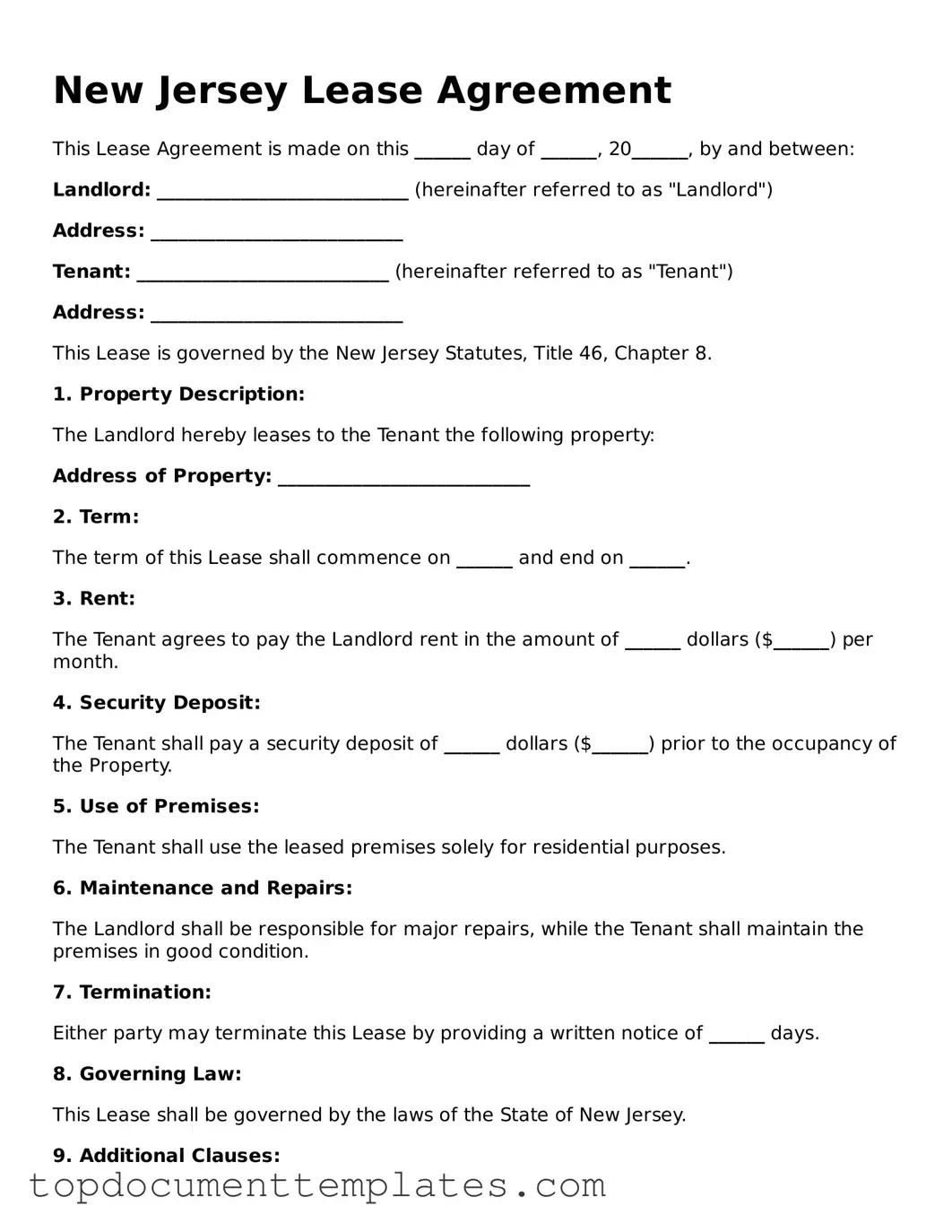Valid Lease Agreement Form for New Jersey State
When renting a property in New Jersey, having a comprehensive lease agreement is essential for both landlords and tenants. This legally binding document outlines the terms and conditions of the rental arrangement, ensuring that both parties understand their rights and responsibilities. Key aspects of the New Jersey Lease Agreement form include the duration of the lease, the amount of rent due, and the payment schedule. Additionally, it specifies security deposit requirements, maintenance responsibilities, and rules regarding pets and alterations to the property. The agreement also addresses the process for handling disputes, terminating the lease, and the consequences of violating any terms. By clearly detailing these elements, the lease agreement helps to prevent misunderstandings and provides a framework for a successful rental experience.
Similar forms
-
Rental Agreement: Similar to a lease, a rental agreement typically covers a shorter duration, often month-to-month. It outlines the terms of occupancy, including rent amount and responsibilities.
-
Sublease Agreement: This document allows a tenant to lease their rented space to another party. It includes terms that mirror those in the original lease, ensuring that obligations are maintained.
- Lease Agreement Form: The Florida Lease Agreement form provides essential details regarding the rental terms and conditions for property in Florida, ensuring both landlords and tenants are on the same page. For further information, you can visit OnlineLawDocs.com.
-
Commercial Lease: Used for business properties, this agreement specifies terms for renting commercial space. It includes clauses related to business operations, maintenance, and lease duration.
-
Roommate Agreement: This document outlines the responsibilities and expectations among individuals sharing a rental property. It covers rent payment, utility sharing, and house rules.
-
Real Estate Purchase Agreement: While focused on buying property, this agreement includes terms like price, closing date, and contingencies, similar to a lease's terms for occupancy.
-
Property Management Agreement: This document establishes the relationship between a property owner and a management company. It details responsibilities for property upkeep, rent collection, and tenant relations.
-
Tenancy Agreement: Often used interchangeably with a lease, this document outlines the rights and duties of both the tenant and landlord, covering aspects like duration, rent, and property use.
Guidelines on Writing New Jersey Lease Agreement
Completing the New Jersey Lease Agreement form requires careful attention to detail. By following these steps, you can ensure that all necessary information is accurately provided, setting the stage for a clear understanding between the landlord and tenant.
- Gather Required Information: Collect all necessary details such as the names of the landlord and tenant, the rental property address, and the lease term.
- Fill in the Parties’ Information: Write the full legal names of both the landlord and tenant at the top of the form. Include contact information for both parties.
- Specify the Property Details: Clearly state the address of the rental property, including unit number if applicable.
- Indicate the Lease Term: Fill in the start and end dates of the lease. Make sure these dates align with your agreed-upon terms.
- Set the Rent Amount: Enter the monthly rent amount and specify the due date. Include details about acceptable payment methods.
- Outline Security Deposit Terms: Indicate the amount of the security deposit and the conditions for its return.
- Include Additional Clauses: If there are any special conditions or rules, such as pet policies or maintenance responsibilities, make sure to include them.
- Review the Agreement: Carefully read through the entire document to ensure all information is correct and complete.
- Sign and Date: Both the landlord and tenant should sign and date the lease agreement at the designated spots.
After completing the form, both parties should keep a signed copy for their records. This ensures that everyone has a clear understanding of the terms of the lease and can refer back to it if needed in the future.
File Information
| Fact Name | Description |
|---|---|
| Governing Law | The New Jersey Lease Agreement is governed by the New Jersey Statutes Annotated (N.J.S.A.) Title 46, which pertains to property law. |
| Types of Leases | This form can be used for residential leases, commercial leases, and other rental agreements. |
| Duration | The lease agreement specifies the duration of the lease, which can be month-to-month or for a fixed term, such as one year. |
| Security Deposit | New Jersey law allows landlords to collect a security deposit, typically equal to one and a half months' rent for leases longer than one year. |
| Rent Payment | The lease must clearly state the amount of rent due, the due date, and acceptable payment methods. |
| Maintenance Responsibilities | Both landlords and tenants have specific responsibilities regarding property maintenance and repairs, which should be outlined in the lease. |
| Termination Notice | Notice requirements for lease termination vary based on the type of lease; for month-to-month leases, a 30-day notice is typically required. |
| Late Fees | The lease may include provisions for late fees, but these must comply with New Jersey's regulations on reasonable amounts. |
| Alterations | Tenants generally need permission from landlords before making significant alterations to the property. |
| Dispute Resolution | The lease may outline procedures for resolving disputes, which can include mediation or arbitration as alternatives to litigation. |
Other Popular Lease Agreement State Forms
Michigan Lease Agreement - It helps establish a timeline for notifying each other of noncompliance or issues.
A New York Bill of Sale form is a legal document that serves to transfer ownership of personal property from one individual to another. This form provides essential details about the transaction, ensuring clarity and protection for both parties involved. To learn more about this important document, you can visit documentonline.org/blank-new-york-bill-of-sale, which helps simplify the buying and selling process in New York.
Lease Agreement Illinois - Landlords may include conditions for tenant behavior within the property.
